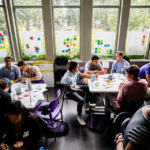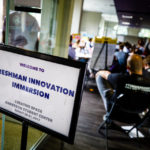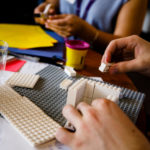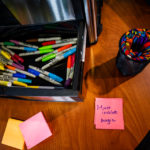"I’m trying to figure out how my skillset could translate to the business world and see what going into business might look like.”
Freshman Rachael Lee carefully added the finishing touches on what appeared to be a short stack of red, white and blue Legos encased in a blob of yellow Play-Doh.
It was nearing the end of day one of the two-day Freshman Innovation Immersion workshop at the University of St. Thomas, where students were embracing their entrepreneurial spirits a week before the academic year kicked off.
More than 80 members of the class of 2021 signed up for this speed-course in entrepreneurship, studying everything from human-centered design (a creative approach to problem solving) and creating business prototypes, to crafting a business model and pitching ideas.
With Schulze School of Entrepreneurship faculty leading, a nonstop buzz filled the Maker Space in the Anderson Student Center as students embraced every challenge thrown their way. They had to work fast and were constantly pushed out of their comfort zones as they learned entrepreneurship fundamentals, all while creating a business concept in just two days.
Lee’s colorful model? A prototype she and three teammates created of a vibrating bracelet wirelessly attached to an alarm clock, intended to motivate you to get out of bed without disturbing your roommate.
Day One: Innovation in problem solving
During the first day of the workshop, students honed in on specific problem statements. From there they crafted solutions through ideation, prototyping and testing, all through an empathetic lens. And they didn’t just come up with a business solution: They interviewed complete strangers across campus to find out what real-world problems they battled.
Lee and her teammates were inspired by a student they talked to who struggled getting out of bed in the morning, leading to their Lego-based solution.
Lee, who is from the Los Angeles area, hasn’t picked a major yet. She saw the Freshman Innovation Immersion workshop as a great way to explore some options.
“I’m an artistic person,” she said. “I have skills that I really don’t know how could extend to things like entrepreneurship. I’m trying to figure out how my skillset could translate to the business world and see what going into business might look like.”
Laura Dunham, Ph.D., associate dean of the Schulze School of Entrepreneurship, ran the program's first day.
“I want students to build their creative confidence and build a sense of excitement around the idea that they can be innovators,” she said. “That they can be people who can find new problems and understand how to research them and feel empathy for the people they’re designing solutions for and design great solutions. We want our students to come out with the skills in whatever area they love, whether it’s the arts or sciences or business – we want all of them to see themselves as people capable of action of being changemakers.”
During a break in the action, Samantha Nordmark, a Russian major from Rolla, North Dakota, said she took the workshop to expand her horizons and meet new people.
“I want to know how to be a better entrepreneur,” said Nordmark, whose team was working on improving health and fitness. “Thinking on my feet while someone’s talking and then taking notes – it was hard. We interviewed eight people in an hour. The first interview was so bad, but by the last interview I finally got it. I need improvement, but I got so much better in just an hour.”
Day 2: Creating a business model
Taking what they learned on the first day, the freshmen reconvened and were paired with mentors, which included upperclassmen and alumni. Mentors helped guide students as they worked on a business model, crafting pitches, putting together poster boards and presenting their business concepts.
A panel of judges heard from the top five teams, which included apps to help motivate kids to do chores, an easier way to make international phone calls and an app to help save you money by going to the gym. The winning concept was the Umbrella Sponge, a tool to make cleaning water bottles easier. The device was the brainchild of Viridiana Arevalo-Martinez, Katherine Baker, Zachary Ban and Lucas Beer.
“We worked together really well,” said Arevalo-Martinez, an entrepreneurship major from Richfield. “It was really fun to put our heads together. Sometimes you think you know everything yourself, but when you start working with other people you realize little things you hadn’t thought about or considered before. We made a lot of changes along the way.”
At the end of the workshop, computer engineer and business major Tejesh Bhimavarapu from Shakopee, said he’s strongly considering an entrepreneurship minor.
“What really stood out to me is they used the word empathy,” Bhimavarapu said. “Empathy is really important. If you develop something for a single person, many people could find it applicable to them. I think that’s very important. If I develop something that’s very near and dear to me, that’s where I’m going to find that passion to push forward.”
Following the pitch competition, students went to CHS Field, home to the St. Paul Saints baseball team, for a talk about innovation and creativity with Saints co-owner Mike Veeck. Much to their delight, actor Bill Murray, another one of the team’s co-owners, made a cameo during their time at the stadium, which also included a picnic and baseball game.
For more information about entrepreneurship degrees and programs offered at the University of St. Thomas, check out the Schulze School of Entrepreneurship.
Hear it from the mentors
Twenty mentors contributed their experience and perspectives, and several offered their reflections on the two-day program.
Matt Michalski, junior real estate major
“I’m a junior, but I’ve been involved in entrepreneurial activities since my freshman year. I’m explaining to the freshmen how I’ve approached pitches in different events. Since I’m a current student, I’m still doing a lot of these business competitions and pitching things in the real world, so having their new ideas thrown at me is super beneficial, as well.”
Diane Paterson, Twin Cities Small Business Development Center (part of the Schulze School of Entrepreneurship at the University of St. Thomas Opus College of Business)
“We serve all kinds of businesses and some of them are student-based. So coming here and seeing these new ideas is really fun.
“I love the students and their fresh ideas and their excitement. You could tell they were having fun because there was constant buzz in the room. It’s a way for them to get to know each other before school starts and an opportunity for them to share their innovative ideas in a safe environment where no one is going to discount your contribution to this business idea.”
Greg Cash, ’79, runs a medical devices business and is a member of the Schulze School of Entrepreneurship advisory board
“I get a lot of personal satisfaction from mentoring. I got a lot out of my St. Thomas education, so I like to give back whenever I can.
“The fact that they’re incoming freshmen and they’re able to put together a presentation, pitch a product, understand what a value proposition is, that they know how to do a positioning statement – that’s pretty cool. I didn’t get into any of that until I was an upperclassman.”
Martha McCarthy Krueger, ’11, co-founder of a social media marketing agency
“I’m a big proponent of entrepreneurship. It’s opened my life since discovering what it’s all about and how to think about business plans and value propositions, all of that. I’m really passionate about it. It’s fun to be able to interface with the younger generation who shares that interest and help answer their questions or steer them in the right direction whenever possible.
“I hope this opens their eyes to innovation and entrepreneurship and lets them know it’s something they’re capable of. You’re not too young or too inexperienced to come up with an idea that’s compelling to someone. Hopefully they get a feel for something they enjoy and that if they have ideas, it’s fun to work through them and problem solve, hash things out and bounce ideas off of other people.”













